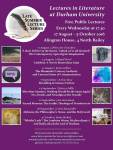From nuclear war to climate change, the hands of the doomsday clock appear to be ticking inevitably closer to catastrophe. In this talk recorded during our Late Summer Lecture series 2016, Diletta De Cristofaro (Harlaxton) surveys how modern writers have responded to the threat of a global apocalypse. She wonders why so few recent novels imagine optimistic scenarios in which global annihilation provides the chance for humankind to rebuild a more utopian civilisation on the other side.
The lack of belief in the future, the idea that, as Douglas Coupland’s JPod (2006) puts it, “we’re all doomed”, is central to contemporary post-apocalyptic fiction. This podcast explores the contemporary apocalyptic imagination, its difference from the traditional apocalyptic paradigm, its relationship with concepts like the “Anthropocene” and the “risk society”, as well as its fundamental concern with time.
Diletta begins by outlining a brief history of the apocalyptic imagination. Whilst we generally think of the apocalypse as a catastrophe of unprecedented proportions and consequences, something which brings about a dystopian post-apocalyptic scenario,apocalypse etymologically denotes the revelation of a utopian teleology in history. Religious apocalyptic writings, such as the Book of Revelation, flourish at a time of crisis because their narratives seek to make sense of troubled periods by revealing that history is tending towards a final resolution which paves the way for a utopian renewal. This apocalyptic conception of history as tending towards utopia founds one of the key notions of western modernity: progress. Yet the doomed futures of contemporary post-apocalyptic fictions suggest that western civilization has abandoned the modern faith in progress.
Considering novels like Cormac McCarthy’s The Road (2006), Will Self’s The Book of Dave (2006), Jeanette Winterson’s The Stone Gods (2007), and Margaret Atwood’s MaddAddam trilogy (2003-2013), the podcast goes on to explore how the contemporary apocalyptic imagination responds to the present conjuncture. To this end, Diletta draws on the notions of Anthropocene – the geological era in which humans have significant impact on the Earth’s ecosystem – and risk society – a society preoccupied with managing and preventing risks it has itself produced. It is not merely that post-apocalyptic dystopian scenarios implicate progress in anthropogenic climate change and other proliferating risks, but that progress itself is a product of the apocalyptic temporal imagination. Ultimately, the podcast discusses how contemporary post-apocalyptic fictions are essentially concerned with the critique of the apocalyptic conception of time.
 The Late Summer Lecture series continues weekly on Wednesdays at 17.30 until October 5th, in Alington House, Durham. Future talks range from literary sex at the seaside, to North East folk tales. While most of the lectures will be podcast, do come along in person for your chance to chat with the presenters over free refreshments before and after their talks. Join the conversation via #LateSummerLectures.
The Late Summer Lecture series continues weekly on Wednesdays at 17.30 until October 5th, in Alington House, Durham. Future talks range from literary sex at the seaside, to North East folk tales. While most of the lectures will be podcast, do come along in person for your chance to chat with the presenters over free refreshments before and after their talks. Join the conversation via #LateSummerLectures.


